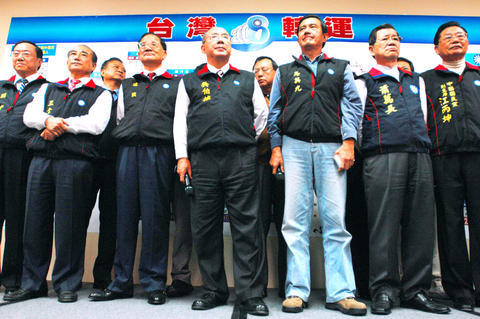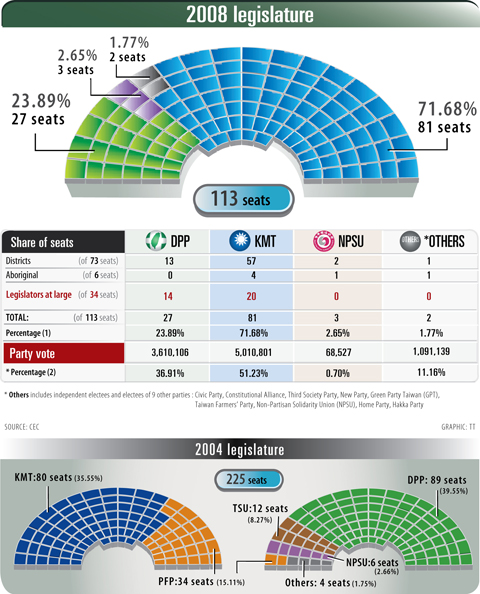The Chinese Nationalist Party (KMT) scored a resounding victory over the Democratic Progressive Party (DPP) in yesterday's seventh legislative elections, winning 81 seats, including 61 district legislator seats, to secure a two-thirds majority that gives it extra legislative powers.
The DPP, despite winning 38.17 percent of the total vote, garnered just 13 district legislator seats.
The Non-Partisan Solidarity Union (NPSU) came in third, with three seats, the People First Party (PFP) claimed one of the six Aboriginal seats and an independent candidate secured victory in Kinmen County.

PHOTO: CNA
The other parties -- including the Taiwan Solidarity Union (TSU) and the New Party -- faired poorly, with none of them reaching the 5 percent threshold required to win legislator-at-large seats.
As a result, the 34 legislator-at-large seats were split between the two main parties, with the KMT receiving 20 seats and the DPP 14.
The Central Election Commission (CEC) said overall turnout for the district legislative poll was 58.50 percent, or 10,050,619 voters.

Both referendums held in conjunction with yesterday's vote failed to attain the 50 percent turnout required for them to pass.
The DPP's plebiscite on recovering the KMT's stolen assets attracted 26.34 percent of voters, or 4,550,881 votes. It received a total of 3,891,179 affirmative votes.
The KMT-initiated referendum on empowering the legislature to investigate corruption involving high-level government officials had a 26.08 percent turnout, with 2,304,136 affirmative votes and 1,656,890 negative votes out of a total of 4,505,927 ballots cast.
In response to the results, President Chen Shui-bian (陳水扁) stepped down as DPP chairman.
Chen, calling the election loss the "worst setback" in the history of the party, told a press conference: "I should and I am willing to shoulder all of the responsibility."
"I resign as chairman, effective immediately. I feel very sorry and I feel shamed by this election result," he said.
KMT Chairman Wu Poh-hsiung (
Wu, with other party leaders at his side, including presidential candidate Ma Ying-jeou (
"I promise we will not abuse the power of the majority but we will use it to stabilize society and unite people, and we will respect the minority in parliament," Wu said.
The KMT's two-thirds majority would allow the party to impeach the president in its own right. In addition, with support from four other legislators, the KMT would have a three-quarters majority and could put constitutional amendments to a referendum.
"It is clear that people are yearning for change after eight years of suffering," Ma said.
He said "a more difficult task" lies ahead -- securing the presidency.
The KMT swept all eight seats in Taipei City, a goal it had dubbed "Sending Eight Immortals Across the Ocean" (
It marked only the second time since 1983 that all of the party's candidates for Taipei City had been elected, the city's Election Commission said.
The DPP had hoped legislative candidates Tuan Yi-kang (段宜康) and Wang Shih-Cheng (王世堅), in particular, could upset their KMT opponents.
Tuan declared defeat at about 6:48pm after trailing KMT opponent Lin Yu-fang (
"I will move on after reflecting deeply. What is more disappointing was the defeat of the DPP overall. There may be a lot of reasons for our defeat, but we will shoulder the responsibility together," Tuan said at his campaign headquarters.
The KMT also won all six seats in Taoyuan County, with all its candidates declaring victory before the official results were announced.
In Taipei County, the KMT won 10 of 12 seats, though DPP candidate and singer/actor Yu Tian (余天) won for the DPP in Sanchong (三重) -- a pan-green stronghold -- defeating his KMT opponent Chu Chun-hsiao (朱俊曉) by just 2,000 votes.
Both Yu and Chu Chun-hsiao declared victory before the Sanchong City Office announced Yu's victory, sparking concern over the result.
Police were dispatched to prevent conflict as supporters of candidates converged on the area.
As expected, KMT Legislator Wu Yu-sheng (
The KMT won 19 of the 21 legislative seats in Miaoli County, Taichung County, Taichung City, Changhua County, Nantou County, Yunlin County, Chiayi County and Chiayi City, losing only Taichung County's second constituency and the second constituency of Chiayi County.
In Changhua County, the KMT took all four seats, with Cheng Ju-fen (
In Chiayi City, the KMT's Chiang Yi-hsiung (
In southern Taiwan, a DPP stronghold, the party lost its dominance in two of the five cities and counties.
The KMT prevailed in three of five districts in Kaohsiung City, with incumbent DPP Legislator Kuan Bi-ling (
The KMT also won three out of the four seats in Kaohsiung County, with only DPP Legislator Chen Chi-yu (
Three-term KMT Legislator Lin Yi-shih (
The KMT's performance in Kaohsiung County was extraordinary, as in the legislative poll in 2004, the pan-green camp garnered 55.73 percent of the vote in Kaohsiung County while the pan-blue camp won only 39.76 percent of ballots.
The DPP managed to win two seats in Tainan City by narrow margins and two out of the three seats in Pingtung County.

MAKING WAVES: China’s maritime militia could become a nontraditional threat in war, clogging up shipping lanes to prevent US or Japanese intervention, a report said About 1,900 Chinese ships flying flags of convenience and fishing vessels that participated in China’s military exercises around Taiwan last month and in January last year have been listed for monitoring, Coast Guard Administration (CGA) Deputy Director-General Hsieh Ching-chin (謝慶欽) said yesterday. Following amendments to the Commercial Port Act (商港法) and the Law of Ships (船舶法) last month, the CGA can designate possible berthing areas or deny ports of call for vessels suspected of loitering around areas where undersea cables can be accessed, Oceans Affairs Council Minister Kuan Bi-ling (管碧玲) said. The list of suspected ships, originally 300, had risen to about

DAREDEVIL: Honnold said it had always been a dream of his to climb Taipei 101, while a Netflix producer said the skyscraper was ‘a real icon of this country’ US climber Alex Honnold yesterday took on Taiwan’s tallest building, becoming the first person to scale Taipei 101 without a rope, harness or safety net. Hundreds of spectators gathered at the base of the 101-story skyscraper to watch Honnold, 40, embark on his daredevil feat, which was also broadcast live on Netflix. Dressed in a red T-shirt and yellow custom-made climbing shoes, Honnold swiftly moved up the southeast face of the glass and steel building. At one point, he stepped onto a platform midway up to wave down at fans and onlookers who were taking photos. People watching from inside

Japan’s strategic alliance with the US would collapse if Tokyo were to turn away from a conflict in Taiwan, Japanese Prime Minister Sanae Takaichi said yesterday, but distanced herself from previous comments that suggested a possible military response in such an event. Takaichi expressed her latest views on a nationally broadcast TV program late on Monday, where an opposition party leader criticized her for igniting tensions with China with the earlier remarks. Ties between Japan and China have sunk to the worst level in years after Takaichi said in November that a hypothetical Chinese attack on Taiwan could bring about a Japanese

STREAMLINED: The dedicated funding would allow the US to transfer equipment to Taiwan when needed and order upgraded replacements for stockpiles, a source said The US House of Representatives on Thursday passed a defense appropriations bill totaling US$838.7 billion, of which US$1 billion is to be allocated to reinforcing security cooperation with Taiwan and US$150 million to replace defense articles provided to the nation. These are part of the Consolidated Appropriation Act, which the US House yesterday passed with 341 votes in favor and 88 against. The act must be passed by the US Senate before Friday next week to avoid another government shutdown. The US House Committee on Appropriations on Monday unveiled the act, saying that it allocates US$1 billion for the Taiwan Security Cooperation Initiative